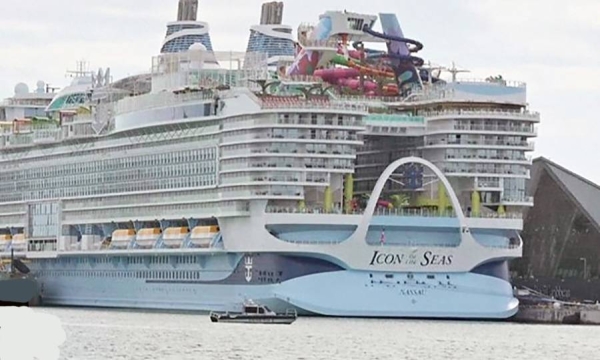
The first cruise ship to board passengers at a US port in 15 months is set to sail Saturday from the industry’s South Florida hub in a symbolic stride toward normalcy that will be watched closely by health experts as vaccines curb the coronavirus’ spread in the country.
Industry officials hope the Celebrity Edge’s voyage serves as a bookend for people for whom the gravity of the pandemic first hit home in the alarming reports last year of deadly outbreaks on crowded ships, with guests quarantined for weeks, vessels begging to dock and sickened passengers carried away on stretchers at ports.
“We are excited to be part of that,” said Russ Schwartz, a Florida school principal who is honeymooning on the ship and is confident it will be smooth sailing. “Things have changed drastically. Back then we really didn’t know much about the virus. Cruises at that point weren’t prepared.”
Celebrity Cruises, one of Royal Caribbean Cruises’ brands, says at least 95 percent of those boarding the Celebrity Edge have been vaccinated against the coronavirus in line with health requirements from the Centers for Disease Control and Prevention, and the ship will run at a reduced capacity.
It will be a luxurious voyage aboard a boat that was unveiled in December 2018 featuring a giant spa and multi-floor suites. The $1 billion vessel will be led by Capt. Kate McCue, who in 2015 became the first American woman to captain a cruise ship and has drawn a following of more than 1 million on TikTok and 250,000 on Instagram.
The stakes are high for cruise lines as they emerge from a CDC-imposed shutdown that lasted 15 months. During that period the three industry giants — Carnival, Norwegian and Royal Caribbean — have had to raise more than $40 billion in financing just to stay afloat without any revenue.
Collectively they lost $20 billion last year and another $4.5 billion in the first quarter of 2021, according to Securities and Exchange Commission filings.
“The cruise lines are getting up off their knees after getting crippled by COVID-19,” said Michael Winkleman, a maritime attorney. “There’s just too much money at stake for the cruise lines not to get it right.”
To comply with both the CDC’s 95 percent vaccination requirement and a new Florida law banning businesses from requiring customers to show proof of vaccination, Celebrity Cruises is simply asking guests if they would like to share their status, spokeswoman Susan Lomax said.
Those who don’t voluntarily show proof of vaccination will be treated as unvaccinated and be subjected to additional protocols such as wearing face masks and being restricted to designated seating areas in common areas like dining rooms, casinos and theaters.
Last year, the CDC castigated the cruise industry for keeping bars, gyms and self-service buffets open and continuing to allow crew members to gather even as the pandemic raged.
Beginning in March 2020, data showed 3,689 confirmed or suspected cases of COVID-19 on cruise ships in US waters, and at least 41 deaths. The CDC says it spent 38,000 person-hours handling just the cruise response to COVID-19, including contact tracing for 11,000 passengers.
Medical evacuation and logistical efforts for passengers disembarking ships such as the Zaandam in Fort Lauderdale and the Grand Princess in Oakland, California, also diverted resources from local agencies that were trying to curb the spread of COVID-19.
Dozens of passengers have since filed lawsuits saying companies failed to protect them and warn them about the virus, especially after an outbreak on Carnival’s Diamond Princess off the coast of Japan with more than 700 confirmed cases and nine deaths.











